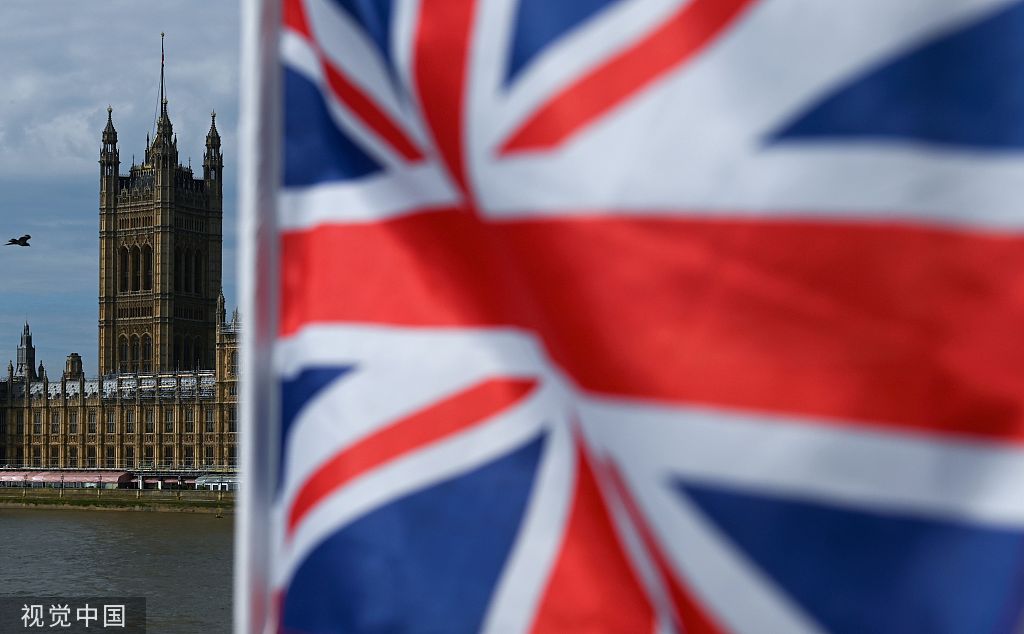Britain's Brexit conundrum
- By Robert Griffiths
 0 Comment(s)
0 Comment(s) Print
Print E-mail China.org.cn, August 29, 2019
E-mail China.org.cn, August 29, 2019

The "national question" that Britain faces now has, in fact, been around in its modern form since the late 19th century.
In 1895, the future Prime Minister David Lloyd George proposed a motion agreed by the House of Commons for "Home Rule All Round." Each of the four historic nations of the United Kingdom – Ireland, Scotland, Wales and England – should have a parliament of its own in which to decide its domestic policies. The Westminster parliament would determine common economic, financial, political and military strategies for the U.K. as a whole and, most importantly back then, decide policy in relation to the far-flung British Empire.
"Home Rule All Round" never happened. Instead, the Irish question overshadowed the others in British public and political life, especially since the partition between the Irish Free State (now the Republic of Ireland) and Northern Ireland in 1922.
Yet the national question in Scotland and Wales never went away either.
Both countries led a largely independent existence before succumbing to the greater economic and military might of their much larger neighbor after a series of wars and uprisings. England's annexation of Wales was finally enacted in the early 16th century, while Scotland's independence was extinguished by the 1707 misnamed Act of Union.
However, the Welsh clung to their distinctive cultural and then religious identity expressed through its own Celtic language, which bears no relation to the Germanic roots of English. Even today, around one-quarter of the Welsh population speak Welsh, many as their first language in communities that remain predominantly Welsh-speaking.
In Scotland, too, distinctive cultural traditions survive, although the Gaelic of the Highlands may be in terminal decline while Lowland Scots (an Anglo-Germanic dialect or language) is also in retreat. But Scotland has retained its own legal and education systems as well as distinctive religious institutions.
Furthermore, the industrialization of major regions of Wales and Scotland has added distinctive social and political aspects to their identities.
In Wales, the native industrialists quickly merged into the Anglo-British capitalist class as a powerful cultural intelligentsia providing political and moral leadership to the nation. In Scotland, a small but influential capitalist class emerged as well as a modernizing, technological intelligentsia.
In the course of the late 19th century and through much of the 20th, the labor movements based on engineering and shipbuilding in southern Scotland and on coal mining and the railways in south Wales both won a reputation for trade union militancy and left-wing politics.
Nationalist movements also developed in both nations, although their main political vehicles – the Scottish National Party (SNP) and Plaid Cymru (the "Party of Wales") – drew most of their leading elements from the petit-bourgeois intelligentsia and the small business sector (notably in agriculture).
Labor's need to head off the nationalist challenge, together with the previous influence of Communists and their allies in the labor movement, eventually secured the establishment of a Scottish Parliament and a Welsh National Assembly in 1999. The powers of both bodies have increased in stages since then, although they remain largely dependent on the central government in London for much of their income.
The shift to the right of "New Labor" governments after 2001 revived support for the SNP and, to a lesser extent, Plaid Cymru. The former won full control of the Scottish Parliament in 2011 and since 2015 has occupied the clear majority of Scottish seats in the Westminster parliament. However, the Scottish SNP government lost a referendum for Scottish separation from the U.K. in 2014.
Brexit has now presented both parties with new opportunities.
Having long since abandoned their opposition to the EU as a centralizing, capitalist free-market and potentially military power bloc, the SNP and Plaid Cymru campaigned strongly for Remain in the 2016 EU referendum. They see support for the EU as the ideal counter to accusations that they are narrow and inward-looking. They also hope and believe that EU membership will, over time, weaken and undermine British state power so that they can capture its remaining fragments in their respective countries.
In Scotland, the SNP was rewarded by a majority vote to stay in the EU. They now accuse the "backward" and insular English of trying to drag the Scottish people out of the EU. That the Scots did not want to be dragged out of the U.K. is conveniently forgotten, as is the estimate that almost one-third of SNP supporters voted to leave the EU.
In Wales, the majority of voters in 2016 rejected EU membership. Plaid Cymru believes that their wishes should be denied, although the party would have reacted with outrage had the narrow referendum vote in 1998 in favor of establishing the Welsh National Assembly been treated with similar contempt.
Ironically, Brexit would mean that decision-making powers would be transferred wholly or partly from the EU to Scotland in 111 policy areas and to Wales in 70. Remaining in the EU would mean those powers remain with the EU Commission and Council of Ministers in Brussels in perpetuity.
But the left-talking nationalist parties have set their sights on a bigger prize. They are not interested in the possibility of having a left-led Labor government at Westminster in a federal Britain. Collaborating with pro-EU Tories and Liberals to block Brexit, the SNP and Plaid Cymru want to win what could eventually turn out to be an illusory "independence" in an increasingly centralist EU.
Robert Griffiths is a former Senior Lecturer in Political Economy and History at the University of Wales and currently the General Secretary of the Communist Party of Britain.
Opinion articles reflect the views of their authors only, not necessarily those of China.org.cn.
If you would like to contribute, please contact us at opinion@china.org.cn.






Go to Forum >>0 Comment(s)